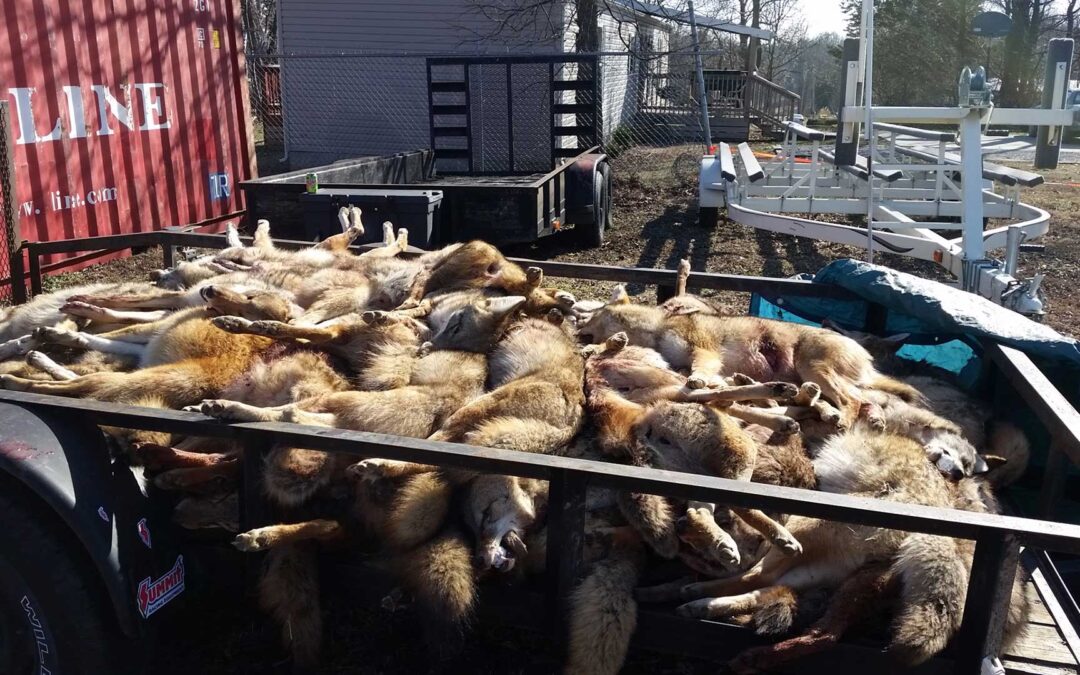Nevada Board of Wildlife Commissioners ignored, science, the public, and Department of Wildlife staff in allowing slaughter for cash and prizes to continue
RENO, NEVADA — At least 23 grisly wildlife killing contests are set to take place in Nevada during the first quarter of 2022. Several more are likely occurring under the radar and out of the public eye according to animal protection groups and wildlife advocates who are tracking the contests.
Wildlife killing contests are organized events in which participants compete for cash and prizes by killing the most or the largest animals over a set amount of time. Contest killing spills onto public lands threatening the safety of recreationists and outdoor enthusiasts as contestants race to slaughter native wildlife over 24-72 hours. These contests promote prizes which are awarded to those who kill the most animals in addition to those who kill coyotes labeled the biggest dog, shot-gunned dog, littlest dog and ugly dog.
Participants often use night vision, thermal imaging scopes and electronic calling devices that mimic the sounds of young animals in distress to lure targets into shooting range. Some contests require a “cell phone video for each kill.” Dead animals are brought in, weighed at set locations and then disposed of, often dumped in ditches or other remote locations.
In November 2021, Nevada Board of Wildlife Commissioners voted 5-4 to reject a proposed rule that would have prohibited a person from participating in, organizing, promoting or sponsoring a contest to kill wildlife —including coyotes, bobcats and foxes — for cash and prizes in the state. The commission’s vote went against public sentiment, the best available science, and an informal recommendation from Nevada Department of Wildlife Director, Tony Wasley.
Now WildEarth Guardians, the Humane Society of the United States, the Center for Biological Diversity and Project Coyote are calling on the state legislature to prohibit these events.
“Piles of massacred native wildlife is not hunting,” said Cheyanne Neuffer of WildEarth Guardians. “The fact that these contests continue shows the inability of our wildlife commissioners to make sound wildlife management decisions. This is a blight on the ideals of the American West.”
“Nevada citizens have made it loud and clear that they will not tolerate killing contests, in which our state’s vital native wildlife are lured into the open with electronic calling devices and then gunned down to be piled up, counted and weighed for cash and champion belt buckles, and then tossed like trash,” said Jeff Dixon, Nevada stat
e director for the Humane Society of the United States. “We ask that our elected officials act quickly to heed the voices of their constituents before more of our wild animals fall victim to this gruesome blood sport in our state.”
“The Nevada Board of Wildlife Commissioners represents a radical view that wildlife is only good for killing, which is far out of step with the mainstream of Nevada,” said Patrick Donnelly, Great Basin director with the Center for Biological Diversity. “Thanks to their negligence, the killing contest carnage is exploding across the state. Since the Commission will not act, we need our elected leaders to step in.”
“Science doesn’t support wildlife killing contests as legitimate wildlife management,” said Michelle Lute, PhD in wildlife management and national carnivore conservation manager for Project Coyote. “Killing contests as management is akin to blood-letting as medicine. Biologists might have once thought lethal control accomplished something but we now know trying to manage carnivores like cash crops is harmful to ecosystems. Modern conservation understands that biodiversity and ecosystem health and function is best managed by protecting natural processes and cycles.”
Conservationists, wildlife scientists, animal welfare groups, and wildlife advocates have long urged the state to end wildlife killing contests, which have been condemned by hunters and professional wildlife managers in the Western states and across the U.S.
Eight other states–Arizona, California, Colorado, New Mexico, Washington, Massachusetts, Maryland and Vermont—have already banned or heavily restricted wildlife killing contests.

